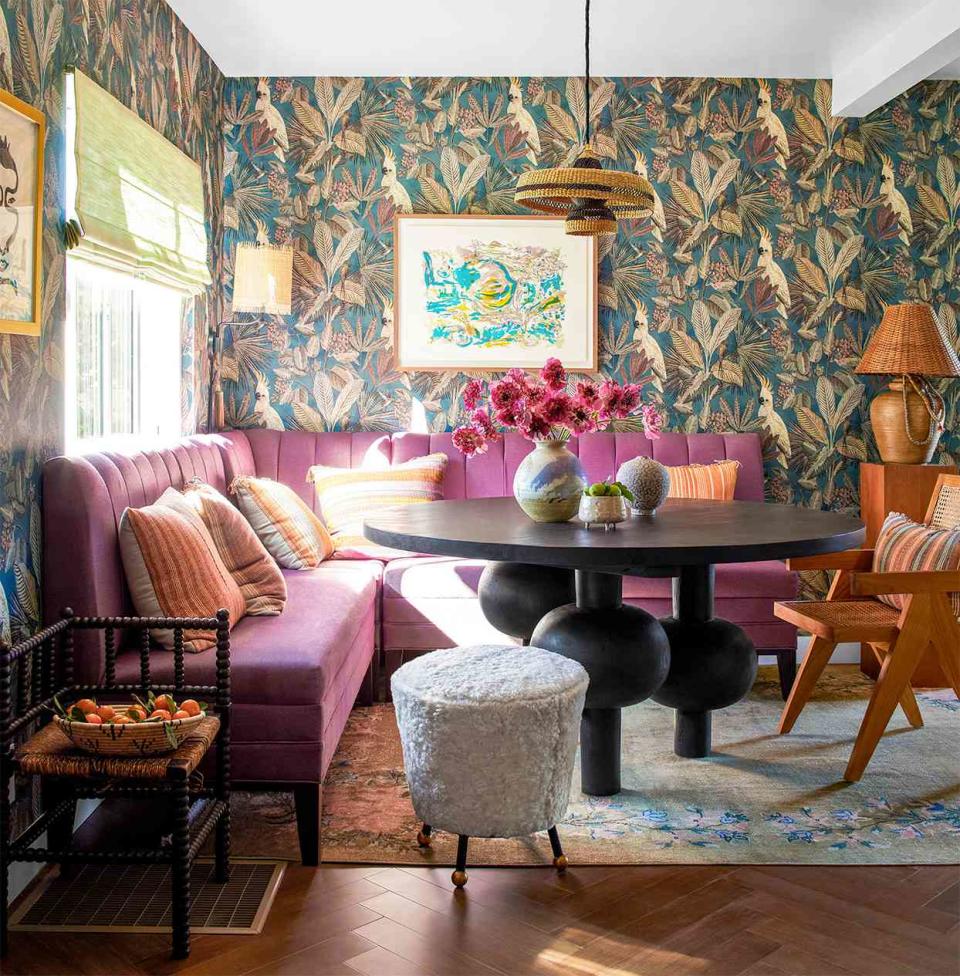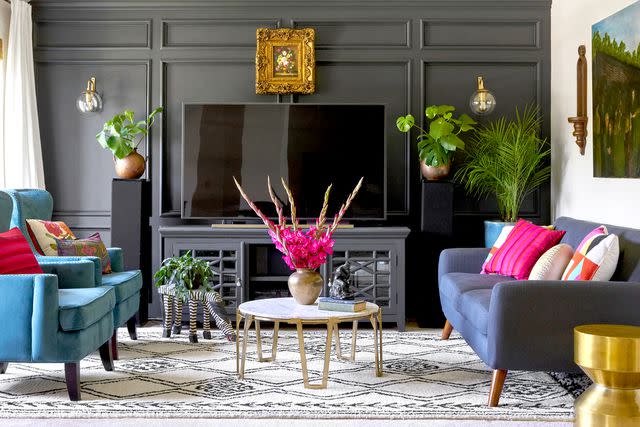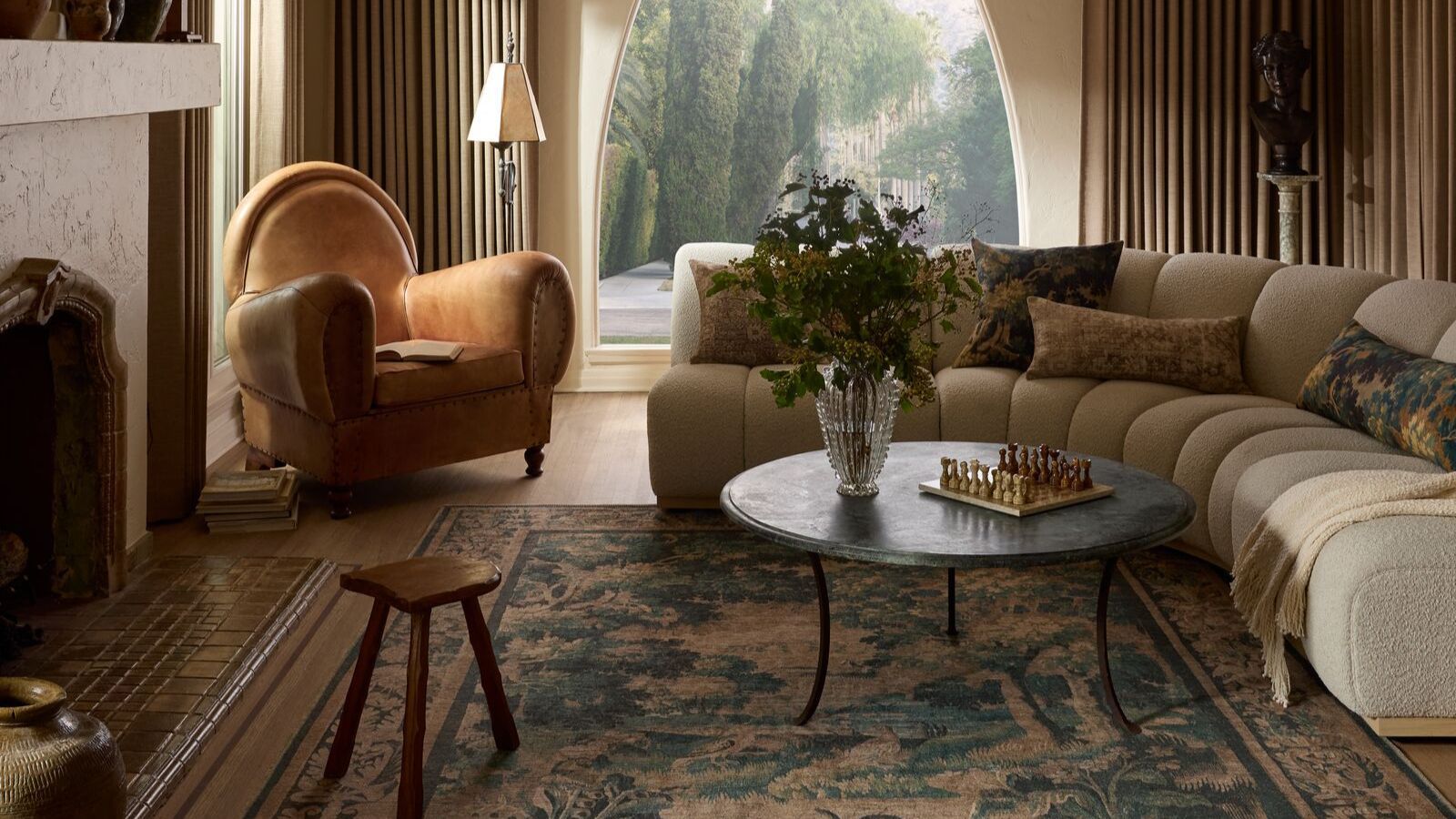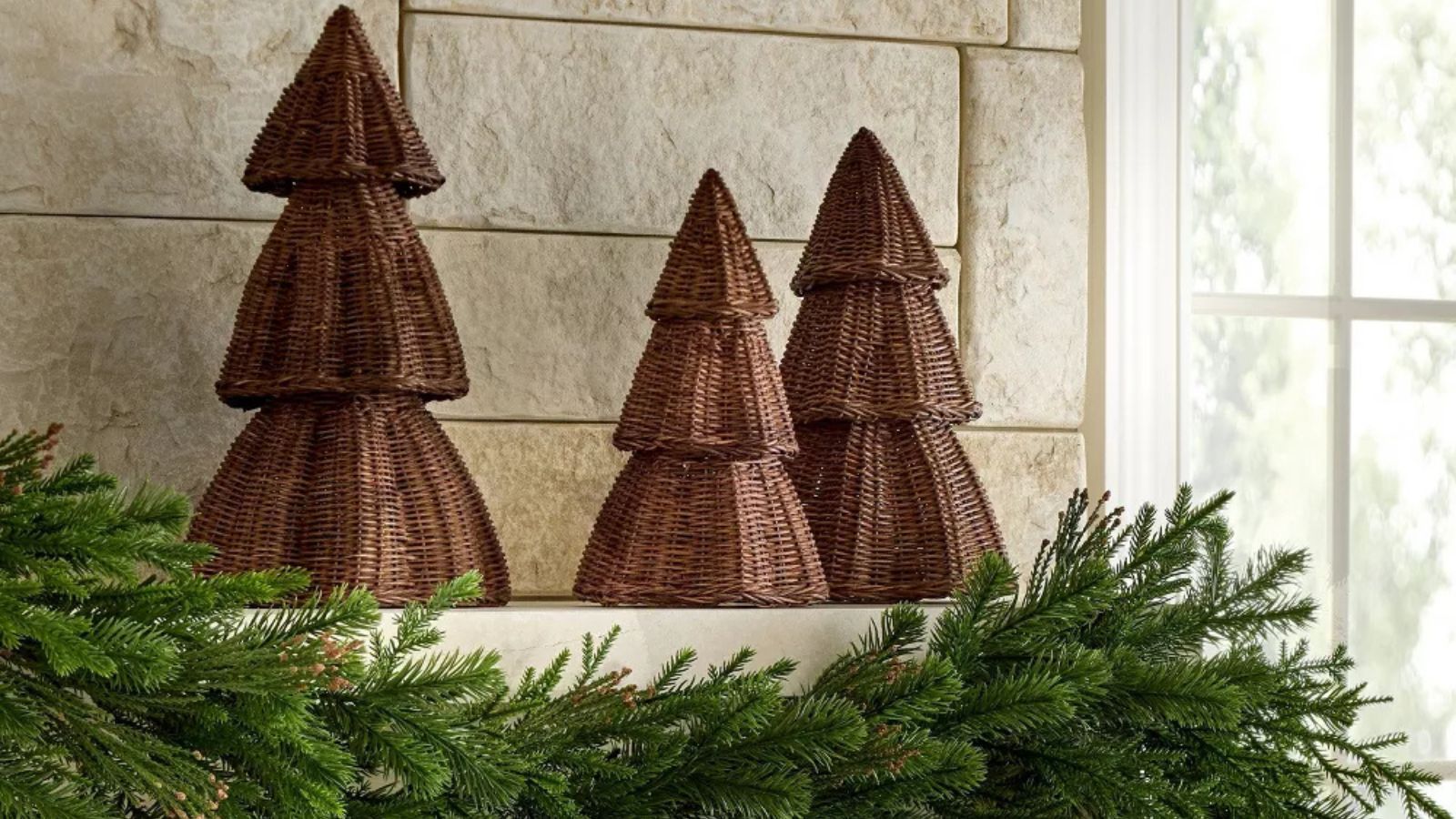8 Home Design Trends We’re Leaving in 2024 (And What to Do Instead)

With moody color palettes, dark timber, and warm metallics, we’re sensing a broader shift towards the comfort and familiarity of traditional design elements.

David Tsay
As we close out 2024, it’s clear that some of the defining home design trends of recent years are on their way out, making room for fresh styles and bold choices that embrace comfort and individuality. From modern minimalist aesthetics to fresh neutral palettes, trends that once felt timeless are already beginning to feel dated. In their wake, an exciting new mix of textures, colors, and shapes is emerging, promising to reshape how we think about our living spaces in 2025.
Drawing on insights from Houzz, paint professionals, and interior designers, we’ve identified the key trends poised to take off in the new year. Things are warming up with moody color palettes, dark timber, and warm metallics, adding richness and depth to interiors. Meanwhile, cluttercore makes a case for intentional, organized abundance, and we’re sensing a broader shift towards the comfort and familiarity of traditional design elements. Read on to catch a glimpse of what you need—and don’t need—to embrace the dynamic design possibilities of 2025.
Related: Discover Your Home Design Style with These Expert Tips

Curves and Arches Replace Sharp Profiles
“Rounded furniture forms featuring gentle curves are having a serious design moment,” says Mitchell Parker, Houzz senior editor. Curved forms and scalloped edges made a strong appearance in 2024, dominating trade shows, but this will be taken to new heights in 2025. Expect to see round coffee and dining tables with cylindrical legs, bulbous sofas and accent chairs, and oblong mirrors everywhere in 2025. “The trend stems from a growing interest in organic modern style, which we first highlighted in our 2024 U.S. Houzz Emerging Summer Trends Report,” Parker says. “It incorporates natural, organic materials, colors, and shapes in a modern way.”
Arches will also continue to add a playful touch to residential interior architecture, softening harsh angles to generate a welcoming, cozy feel. “Design and remodeling pros are incorporating arches throughout the home for doorways, windows, niches, cabinets, and millwork details,” Parker says. “Expect to see more elaborately arched mirrors in 2025, as well as headboards with ogee or trefoil profiles and chairs with similarly scalloped silhouettes.”
Related: How to Hang a Heavy Mirror for a Statement Piece That Won’t Budge

Lauren Andersen/Sen Creative / Interior Designer: Noz Nozawa
Light Blue Dwindles as Berry Tones Dominate
Dial down the breezy blues of 2024 as we shift into a new year dominated by intense berry shades. According to the 2025 Colors of the Year announced so far, oxblood and other rich purple-red and earthy brown hues are set to dominate both fashion and interiors. These enticing hues create striking focal points, bringing a fearless, seductive feel to any space. “These shades work beautifully on accent walls, furniture pieces, and textiles, adding a sense of opulence and intensity that’s perfect for those looking to make a strong statement in their home decor,” says Nicole Roe of R. Nickson Interiors.
Farrow & Ball brand ambassador Patrick O’Donnell highlights the “glorious deep lilac shade” emerging as a key color for 2025. “Think Hamish Bowles tweed suit, coral and apricot tones which have a nostalgic whiff of English country house from the 1950s and 60s, and the 1970s glamour of brown,” he says. O’Donnell also notes that while blue shades may be stepping back, they’re far from disappearing. Brighter, cleaner mid-blues will still make a statement in interiors, offering a striking contrast to the bold berry tones taking the spotlight this year.
Related: The 10 Best Interior Paints of 2024 for Your Living Room, Bedroom, Bathroom, and Kitchen

Classic English-Style Kitchens Replace the Sleek, Modern Look
Homeowners are making a 180-degree turn when looking for kitchen renovation inspiration, moving away from yesteryear’s hyper-sleek, modern designs towards the familiar charm of classic English country-style kitchens. Light, flat panel cabinets give way to shaker-style cabinetry in warming timber tones and historical hues, like inky blues and forest greens. “You’ll also see more natural countertop materials like soapstone and butcher’s block, as well as large range alcoves, wood ceiling beams, and collected looks that appear pieced together over time,” Parker predicts. “Tones and materials that exist in nature create a purposeful, warm atmosphere,” adds Lauren Farrell, principal of interior design at Pacaso.
Related: 15 Cottage-Style Homes with Cozy Charm

Pair Brown with Black
Black remains the ultimate neutral and timeless staple in interior design, renowned for its versatility, depth, and refinement. However, black on its own can sometimes feel stark, cold, or overly modern—all elements that are taking a back seat in 2025. The solution? Warm brown hues. “In 2025, interiors will be dominated by black and brown, rust, and oxblood, creating moody yet earthy spaces with a confident edge,” Roe says. When paired, black and brown—two deep, grounded neutrals—conjure a sophisticated, luxurious feel.
“These dark tones bring depth and grounding to a space and balance modern elegance with natural earthiness,” Roe adds, recommending the addition of rusty accents to bring the palette to life. Rust, with its warm orange undertones, echoes the vibrancy of autumn leaves and pairs beautifully with natural textures like wood and leather, infusing spaces with warmth and richness.
Related: 22 Sophisticated Ways to Decorate with Brown

Dustin Peck
Ditch ‘Less is More’ in Favor of Cluttercore
“Designers are getting requests from homeowners for a more-is-more approach that layers bold color, pattern, and texture,” Parker says. “Whether you call it maximalism or cluttercore, this design approach celebrates abundance and allows homeowners to furnish their homes with pieces that reflect their personalities.”
Emerging from platforms like TikTok as a response to the sterile, impersonal nature of minimalism, cluttercore combines maximalist principles with nostalgia and sentimentality at its core. Unlike curated, high-end decor with little emotional connection, cluttercore prioritizes personal items that tell a story and hold sentimental value. This trend aligns with the growing desire for homes that feel cozy, charming, and creatively liberating. “Think bold grooved wall and ceiling paneling, woven materials, and patterns everywhere—drapery, furniture, rugs, and pillows,” Parker says.
“While layering textures is nothing new, mixing textures, like velvet, linen, and leather, and contrasting them with unexpected metals, glass, and ceramics, will set the tone for an eclectic interior space, bringing both visual interest and tactile richness,” adds Sharon Blaustein, principal and founder of B Interiors.
Related: How to Layer Rugs: Advice and Inspiration from Designers

Dark Timber Tops Blonde Oak
Warmth has been a key focus for homeowners in recent years, marked by a shift from cool whites and grays to warm neutrals, earthy hues, and rich timber textures. Light, blonde oaks, synonymous with contemporary and Scandinavian design, have dominated Instagram and Pinterest in recent years. However, in 2025, timber tones are taking a dramatic turn.
In line with the muddy and moody color palette predictions announced by leading paint suppliers like Benjamin Moore, wood textures are embracing darker, richer shades to add depth and sophistication to our homes. “Paired with warm neutral palettes, earthy tones, and organic colors, we’re seeing wood elements used as ceiling beams, trim, millwork, wall paneling, posts, and cabinetry to add architectural warmth to spaces throughout the home,” Parker says.
Related: Natural Wood Tones Are Trending: Here’s How to Incorporate the Material

Brass Makes Room for Other Warm Metallics
In 2024, polished brass, brushed brass, and champagne gold have reigned as the most coveted metallic finishes, admired for their warm, luxurious appeal. While these warm metallics aren’t going anywhere in 2025, their range is expanding. The growing trend for rich, earthy tones has sparked a resurgence in the demand for copper accents. Known for its natural, vintage charm and the unique patina it develops over time, copper adds a vibrant, inviting sheen to any space. Hot on its heels is brushed nickel, celebrated for its versatility, practicality, and understated elegance. Unlike the cooler, industrial feel of stainless steel, brushed nickel has a warm undertone and a softer, muted shine, making it ideal for modern, minimalist interiors.
Can’t decide which finish to choose? There’s no need to pick just one. Mixed metal designs are expected to thrive in 2025, offering the flexibility to pair black with brass or brushed nickel with copper across everything from light fixtures to cabinetry hardware, sockets, switches, and bathroom fittings. This approach allows homeowners to create personalized, dynamic designs that blend modern flair with timeless sophistication.
Related: How to Mix Metals in Your Home: 5 Tips to Decorate With Metals Flawlessly

James Nathan Schroder
Swap Color Blocking for Surprising Pops of Color
“Color brightens our lives and creates memories in our homes, but there are several reasons why we might not always want to decorate a whole room,” says Joa Studholme, color curator for Farrow & Ball. “Luckily, modest amounts of color can make huge statements.” One way to introduce color without overpowering a space is by creating a focal point with painted borders. For example, give doors a dramatic touch by adding an oversized painted frame that extends beyond the architrave and onto the ceiling, or frame a mirror or piece of artwork that feels too small for the room with a colorful border. “Architraves are typically seen as functional, not decorative,” Studholme explains. “Why not flip that idea and add a lively pop of color to these often-overlooked features?” This same idea can be applied to arches or architraves that divide two spaces; paint them in a punchy color, like Bamboozle, for an extra decorative twist.
Another great place to introduce pops of color—such as with the unexpected red theory—is inside kitchen units and closets. Bright hues in these often hidden spaces offer a fun surprise without dominating the overall aesthetic of the room. “When looking to introduce a cheeky glimpse of color, the edge of a door may be the last place you’d think of, but it can’t fail to make you smile,” Studholme says.
Related: How to Choose Interior Color Schemes You’ll Love
link






:strip_icc()/103251082_preview-7a1cd89728c14514bf3ca9fa69ddfa8a.jpg)